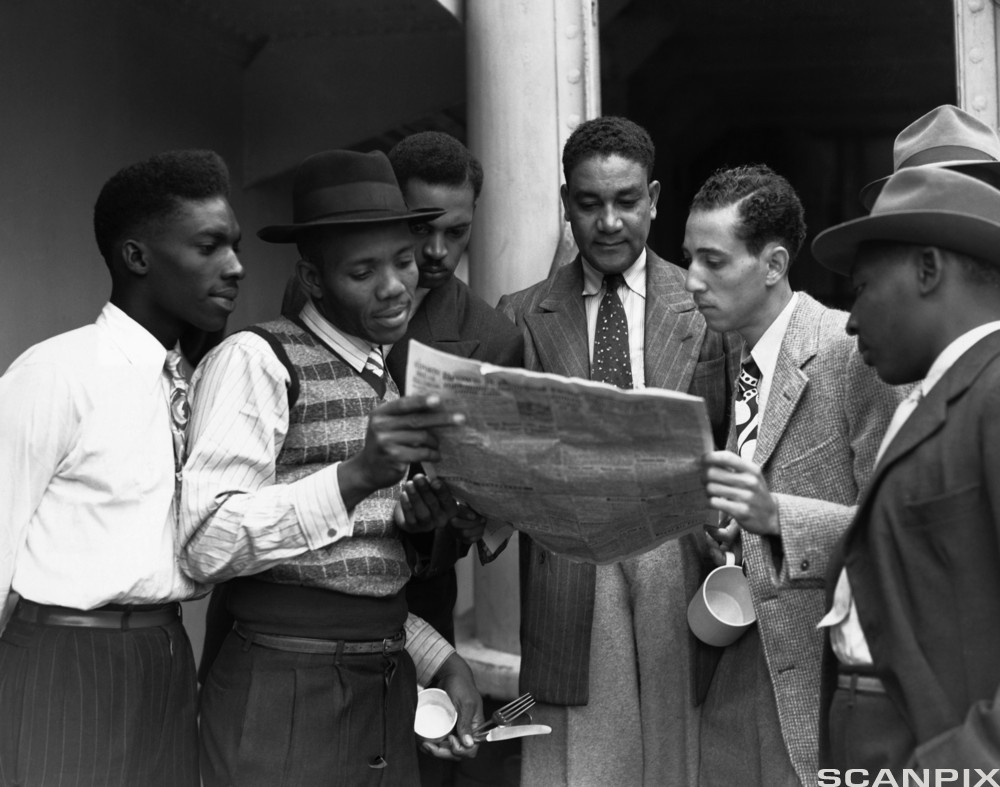Articles
- The 20th century
- Key events
- Making sense of the tangible world
- Health and Welfare
- Space exploration
- Scientific advancement: computers, technology & textiles
- Monarchy
- Democracy & social mobility
- Transport and leisure
- Colonialism & post-colonialism
- Sexuality, marriage, parenthood & divorce
- Income & consumerism
- Humans and the environment
- Educational context
- Mass culture & entertainment
- The world of work
- Making sense of the intangible world
Immigration and integration
1940s & 1950s
Aftermath of the Second World War
During the Second World War, many British people were killed. As a result, when the war was over, there was a shortage of workers. The British government tackled this by encouraging mass migration from member countries of the British Empire and Commonwealth.
The British Nationality Act, 1948
 This law said that all residents of Commonwealth countries were British citizens and were entitled to enter and settle in the United Kingdom. As a result:
This law said that all residents of Commonwealth countries were British citizens and were entitled to enter and settle in the United Kingdom. As a result:- Indians and Pakistanis began to arrive in large numbers once their countries became independent in 1947. Many of them worked in factories or drove buses. Some ran small shops or post offices
- The first of many Afro-Caribbean immigrants from the West Indies arrived by boat on the Empire Windrush in 1948. Many of them found work in public transport (buses and trains) and in the National Health Service.
They often settled in large numbers in poorer areas of large cities. For example, in London, many Indians settled in Southall and many West Indians in Brixton.
Immigration from Europe
- Immediately after the Second World War, large numbers of Poles and Ukrainians fled to the United Kingdom, because their countries had become part of the Soviet Union
- In 1956, there was an unsuccessful uprising in Hungary against Soviet rule. Following this, many Hungarians fled to the United Kingdom.
Racism
Many Afro-Caribbean immigrants, in particular, experienced racial prejudice:
- Some companies refused to employ them
- Some landlords would not rent property to them
- Some pubs would not allow them in.
Violence
Clashes occurred between members of the black and white communities in London, Birmingham and other major cities. One positive outcome of these clashes was the creation, in 1959, of the annual Notting Hill Carnival in London, celebrating Afro-Caribbean culture.
1960s
- Two Commonwealth Immigrants Acts were passed in 1962 and 1968. These both restricted the right to migrate to the United Kingdom
- In 1965, the Race Relations Act made it a crime to discriminate against people because of the colour of their skin
- A new wave of Indian migrants arrived in the United Kingdom in the years following 1965, after being expelled from Uganda and Kenya.
A growing unease amongst some sections of white British society, who were concerned about their own economic survival, was voiced by Conservative politician Enoch Powell in a speech given in1968. Although he was sacked for expressing racist sentiments, many subsequently demonstrated their support for his views.
1970s and 1980s
Riots: The 1970s was a decade of economic recession. It hit members of the Afro-Caribbean community particularly hard. In the early 1980s, their anger and frustration led to a series of riots in cities such as London, Birmingham, Bristol, Manchester and Liverpool.
- British Nationality Act, 1981: This placed further restrictions on the right to migrate to the United Kingdom.
- Somalis: A civil war in Somalia, which continued into the 1990s, led to many Somali citizens being granted asylum in the United Kingdom.
1990s - today
Labour governments, 1997-2010
The governments led by Tony Blair and Gordon Brown removed some of the restrictions on people migrating from outside Europe. As a result, numbers of migrants rose considerably. This was a controversial policy, welcomed by some but condemned by others.
The European Union
The United Kingdom joined the European Union in 1973. One of the rules of the European Union is that people can move freely between its member countries. Since 2004, the membership of the European Union has grown from 15 to 28 countries, fuelled by the collapse of the Soviet bloc. Many of these new member countries are poorer nations from Central and Eastern Europe, for example Poland and Hungary. Large numbers of people have migrated to the United Kingdom from these countries, seeking a higher standard of living.
Immigration continues to cause concern in some sectors of British society. Although it provides employees and opportunity, it also puts pressure on public services. A number of politicians now seek to restrict the numbers coming to the UK and seek to reserve social security benefits only for those who have paid into the system for some years
A political-economic union of European member states.
A grouping of states aligned with the Soviet Union.
